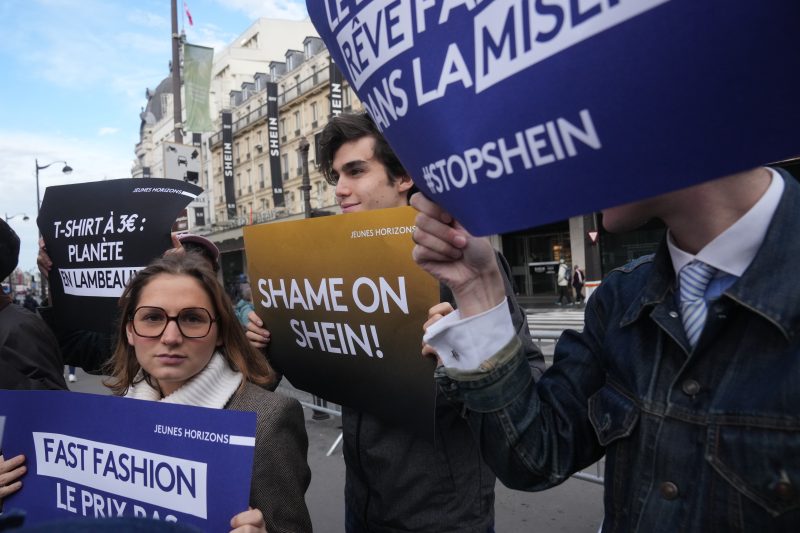Top Stories
Shein Faces Backlash Over Childlike Sex Dolls as Paris Store Opens

UPDATE: Fast-fashion giant Shein is under fire as it opens its first permanent store in Paris today, November 5, 2025, amid a fierce backlash over the sale of childlike sex dolls. The controversy has sparked outrage from environmental groups, local officials, and the French ready-to-wear industry, making this launch one of the most contentious in recent memory.
Authorities confirmed that French regulators discovered sex dolls with childlike features listed on Shein’s website last week. The case has been escalated to prosecutors, with the government warning that Shein could face a ban in the French market if such listings resurface. In response, Shein announced that it has banned all sex-doll products and temporarily removed its adult products category for review.
An online petition opposing the Paris opening has gained over 120,000 signatures, demonstrating widespread discontent among child protection and environmental advocates. Protesters gathered outside the BHV Marais department store where the store debuted, but their presence did not deter shoppers, many of whom were drawn by Shein’s low prices.
Ticia Ones, a frequent online customer, expressed mixed feelings about the brand. “We can see what we order, touch the items, it’s a good thing,” she said, emphasizing that the brand’s affordability was a major factor in her visit despite the surrounding controversy.
The management of BHV Marais condemned the sale of such dolls but commended Shein for its quick action to address the issue. Karl-Stéphane Cottendin, COO of the Société des Grands Magasins, which owns BHV, stated, “We are proud to have a partner who has spoken out firmly. We are very happy to be opening the boutique.”
Founded in China in 2012 and now headquartered in Singapore, Shein has rapidly become a global player in fast fashion. However, it has faced accusations regarding labor practices linked to forced labor in regions like Xinjiang, where the Chinese government has been criticized for human rights abuses against the Uyghur population. Cottendin dismissed these allegations, claiming Shein has improved its production practices significantly.
The environmental impact of fast fashion is another pressing concern. The United Nations has warned that the textile sector contributes nearly 10% of global greenhouse gas emissions and exacerbates water depletion. France is moving to rein in the influence of fast fashion companies like Shein, with a draft law targeting these firms through consumer awareness campaigns, advertising bans, and stricter waste management rules.
As the backlash continues, French officials and industry leaders express deep concern. “It’s a black day for our industry,” said Thibaut Ledunois, director of entrepreneurship and innovation at the French federation of women’s ready-to-wear. “Shein is developing a beautiful showcase in our country, justifying all the bad, and sad and horrible business that they develop all around the world.”
What happens next for Shein remains to be seen, but the retailer’s ability to navigate this controversy could reshape its future in the French market. As consumers and activists keep a watchful eye, this developing story is set to have significant repercussions for fast fashion in Europe.
-

 Science3 weeks ago
Science3 weeks agoInterstellar Object 3I/ATLAS Emits Unique Metal Alloy, Says Scientist
-

 Politics3 weeks ago
Politics3 weeks agoAfghan Refugee Detained by ICE After Asylum Hearing in New York
-

 Business3 weeks ago
Business3 weeks agoIconic Sand Dollar Social Club Listed for $3 Million in Folly Beach
-

 Health3 weeks ago
Health3 weeks agoPeptilogics Secures $78 Million to Combat Prosthetic Joint Infections
-

 Science3 weeks ago
Science3 weeks agoResearchers Achieve Fastest Genome Sequencing in Under Four Hours
-

 Lifestyle3 weeks ago
Lifestyle3 weeks agoJump for Good: San Clemente Pier Fundraiser Allows Legal Leaps
-

 Science3 weeks ago
Science3 weeks agoMars Observed: Detailed Imaging Reveals Dust Avalanche Dynamics
-

 Health3 weeks ago
Health3 weeks agoResearcher Uncovers Zika Virus Pathway to Placenta Using Nanotubes
-

 World3 weeks ago
World3 weeks agoUS Passport Ranks Drop Out of Top 10 for First Time Ever
-

 Entertainment3 weeks ago
Entertainment3 weeks agoJennifer Lopez Addresses A-Rod Split in Candid Interview
-

 Business3 weeks ago
Business3 weeks agoSan Jose High-Rise Faces Foreclosure Over $182.5 Million Loan
-

 Top Stories3 weeks ago
Top Stories3 weeks agoChicago Symphony Orchestra Dazzles with Berlioz Under Mäkelä









